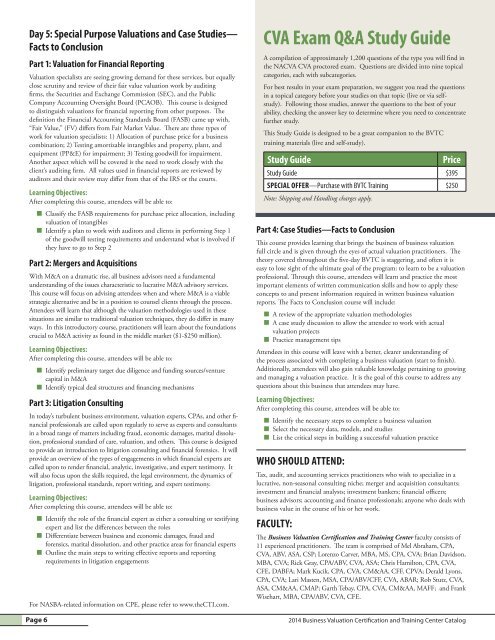Business Valuation Certification and Training Center Catalog
The Consultants’ Training InstituteTM (CTITM) is comprised of leading experts in the fields of business valuation, financial litigation, financial forensics and forensic accounting, mergers and acquisitions, healthcare valuation and consulting, and a variety of other related business consulting disciplines. As the most widely respected professional training organization, the CTI combines hundreds of years of practitioner experience with academic insights to produce benchmark training and certification programs in the accounting and financial consulting industry’s hottest growth niches. What are these niches? Accounting Today’s 2013 Top 100 Firms growth analysis lists business valuations, forensics/fraud, litigation support, and mergers and acquisitions at or near the top of its list 17 years running. Also among the top growth niches were succession planning, risk management, and bankruptcy/insolvency. What does this mean? These niches are where the top visionaries of the CPA and business consulting professions see the greatest opportunities for future growth. And the CTI—which has now trained over 31,000 practitioners— offers trenchant training programs in these disciplines. And many others. The CTI’s greatest contribution to the valuation and business consulting industries is our certification programs offered in conjunction with the National Association of Certified Valuators and AnalystsTM (NACVA®) and numerous partners.
The Consultants’ Training InstituteTM
(CTITM) is comprised of leading experts
in the fields of business valuation,
financial litigation, financial forensics
and forensic accounting, mergers and
acquisitions, healthcare valuation
and consulting, and a variety of other
related business consulting disciplines.
As the most widely respected
professional training organization, the
CTI combines hundreds of years of practitioner experience with
academic insights to produce benchmark training and certification
programs in the accounting and financial consulting industry’s
hottest growth niches. What are these niches? Accounting Today’s
2013 Top 100 Firms growth analysis lists business valuations,
forensics/fraud, litigation support, and mergers and acquisitions
at or near the top of its list 17 years running. Also among the
top growth niches were succession planning, risk management,
and bankruptcy/insolvency. What does this mean? These niches
are where the top visionaries of the CPA and business consulting
professions see the greatest opportunities for future growth. And
the CTI—which has now trained over 31,000 practitioners—
offers trenchant training programs in these disciplines. And many
others. The CTI’s greatest contribution to the valuation and
business consulting industries is our certification programs offered
in conjunction with the National Association of Certified Valuators
and AnalystsTM (NACVA®) and numerous partners.
You also want an ePaper? Increase the reach of your titles
YUMPU automatically turns print PDFs into web optimized ePapers that Google loves.
Day 5: Special Purpose <strong>Valuation</strong>s <strong>and</strong> Case Studies—<br />
Facts to Conclusion<br />
Part 1: <strong>Valuation</strong> for Financial Reporting<br />
<strong>Valuation</strong> specialists are seeing growing dem<strong>and</strong> for these services, but equally<br />
close scrutiny <strong>and</strong> review of their fair value valuation work by auditing<br />
firms, the Securities <strong>and</strong> Exchange Commission (SEC), <strong>and</strong> the Public<br />
Company Accounting Oversight Board (PCAOB). This course is designed<br />
to distinguish valuations for financial reporting from other purposes. The<br />
definition the Financial Accounting St<strong>and</strong>ards Board (FASB) came up with,<br />
“Fair Value,” (FV) differs from Fair Market Value. There are three types of<br />
work for valuation specialists: 1) Allocation of purchase price for a business<br />
combination; 2) Testing amortizable intangibles <strong>and</strong> property, plant, <strong>and</strong><br />
equipment (PP&E) for impairment; 3) Testing goodwill for impairment.<br />
Another aspect which will be covered is the need to work closely with the<br />
client’s auditing firm. All values used in financial reports are reviewed by<br />
auditors <strong>and</strong> their review may differ from that of the IRS or the courts.<br />
Learning Objectives:<br />
After completing this course, attendees will be able to:<br />
n Classify the FASB requirements for purchase price allocation, including<br />
valuation of intangibles<br />
n Identify a plan to work with auditors <strong>and</strong> clients in performing Step 1<br />
of the goodwill testing requirements <strong>and</strong> underst<strong>and</strong> what is involved if<br />
they have to go to Step 2<br />
Part 2: Mergers <strong>and</strong> Acquisitions<br />
With M&A on a dramatic rise, all business advisors need a fundamental<br />
underst<strong>and</strong>ing of the issues characteristic to lucrative M&A advisory services.<br />
This course will focus on advising attendees when <strong>and</strong> where M&A is a viable<br />
strategic alternative <strong>and</strong> be in a position to counsel clients through the process.<br />
Attendees will learn that although the valuation methodologies used in these<br />
situations are similar to traditional valuation techniques, they do differ in many<br />
ways. In this introductory course, practitioners will learn about the foundations<br />
crucial to M&A activity as found in the middle market ($1-$250 million).<br />
Learning Objectives:<br />
After completing this course, attendees will be able to:<br />
n Identify preliminary target due diligence <strong>and</strong> funding sources/venture<br />
capital in M&A<br />
n Identify typical deal structures <strong>and</strong> financing mechanisms<br />
Part 3: Litigation Consulting<br />
In today’s turbulent business environment, valuation experts, CPAs, <strong>and</strong> other financial<br />
professionals are called upon regularly to serve as experts <strong>and</strong> consultants<br />
in a broad range of matters including fraud, economic damages, marital dissolution,<br />
professional st<strong>and</strong>ard of care, valuation, <strong>and</strong> others. This course is designed<br />
to provide an introduction to litigation consulting <strong>and</strong> financial forensics. It will<br />
provide an overview of the types of engagements in which financial experts are<br />
called upon to render financial, analytic, investigative, <strong>and</strong> expert testimony. It<br />
will also focus upon the skills required, the legal environment, the dynamics of<br />
litigation, professional st<strong>and</strong>ards, report writing, <strong>and</strong> expert testimony.<br />
Learning Objectives:<br />
After completing this course, attendees will be able to:<br />
n Identify the role of the financial expert as either a consulting or testifying<br />
expert <strong>and</strong> list the differences between the roles<br />
n Differentiate between business <strong>and</strong> economic damages, fraud <strong>and</strong><br />
forensics, marital dissolution, <strong>and</strong> other practice areas for financial experts<br />
n Outline the main steps to writing effective reports <strong>and</strong> reporting<br />
requirements in litigation engagements<br />
For NASBA-related information on CPE, please refer to www.theCTI.com.<br />
Page 6<br />
CVA Exam Q&A Study Guide<br />
A compilation of approximately 1,200 questions of the type you will find in<br />
the NACVA CVA proctored exam. Questions are divided into nine topical<br />
categories, each with subcategories.<br />
For best results in your exam preparation, we suggest you read the questions<br />
in a topical category before your studies on that topic (live or via selfstudy).<br />
Following those studies, answer the questions to the best of your<br />
ability, checking the answer key to determine where you need to concentrate<br />
further study.<br />
This Study Guide is designed to be a great companion to the BVTC<br />
training materials (live <strong>and</strong> self-study).<br />
Study Guide<br />
Part 4: Case Studies—Facts to Conclusion<br />
This course provides learning that brings the business of business valuation<br />
full circle <strong>and</strong> is given through the eyes of actual valuation practitioners. The<br />
theory covered throughout the five-day BVTC is staggering, <strong>and</strong> often it is<br />
easy to lose sight of the ultimate goal of the program: to learn to be a valuation<br />
professional. Through this course, attendees will learn <strong>and</strong> practice the most<br />
important elements of written communication skills <strong>and</strong> how to apply these<br />
concepts to <strong>and</strong> present information required in written business valuation<br />
reports. The Facts to Conclusion course will include:<br />
n A review of the appropriate valuation methodologies<br />
n A case study discussion to allow the attendee to work with actual<br />
valuation projects<br />
n Practice management tips<br />
Attendees in this course will leave with a better, clearer underst<strong>and</strong>ing of<br />
the process associated with completing a business valuation (start to finish).<br />
Additionally, attendees will also gain valuable knowledge pertaining to growing<br />
<strong>and</strong> managing a valuation practice. It is the goal of this course to address any<br />
questions about this business that attendees may have.<br />
Learning Objectives:<br />
After completing this course, attendees will be able to:<br />
n Identify the necessary steps to complete a business valuation<br />
n Select the necessary data, models, <strong>and</strong> studies<br />
n List the critical steps in building a successful valuation practice<br />
Who Should Attend:<br />
Tax, audit, <strong>and</strong> accounting services practitioners who wish to specialize in a<br />
lucrative, non-seasonal consulting niche; merger <strong>and</strong> acquisition consultants;<br />
investment <strong>and</strong> financial analysts; investment bankers; financial officers;<br />
business advisors; accounting <strong>and</strong> finance professionals; anyone who deals with<br />
business value in the course of his or her work.<br />
Faculty:<br />
Price<br />
Study Guide $395<br />
Special OffER—Purchase with BVTC <strong>Training</strong> $250<br />
Note: Shipping <strong>and</strong> H<strong>and</strong>ling charges apply.<br />
The <strong>Business</strong> <strong>Valuation</strong> <strong>Certification</strong> <strong>and</strong> <strong>Training</strong> <strong>Center</strong> faculty consists of<br />
11 experienced practitioners. The team is comprised of Mel Abraham, CPA,<br />
CVA, ABV, ASA, CSP; Lorenzo Carver, MBA, MS, CPA, CVA; Brian Davidson,<br />
MBA, CVA; Rick Gray, CPA/ABV, CVA, ASA; Chris Hamilton, CPA, CVA,<br />
CFE, DABFA; Mark Kucik, CPA, CVA, CM&AA, CFF, CPVA; Derald Lyons,<br />
CPA, CVA; Lari Masten, MSA, CPA/ABV/CFF, CVA, ABAR; Rob Stutz, CVA,<br />
ASA, CM&AA, CMAP; Garth Tebay, CPA, CVA, CM&AA, MAFF; <strong>and</strong> Frank<br />
Wisehart, MBA, CPA/ABV, CVA, CFE.<br />
2014 <strong>Business</strong> <strong>Valuation</strong> <strong>Certification</strong> <strong>and</strong> <strong>Training</strong> <strong>Center</strong> <strong>Catalog</strong>

















